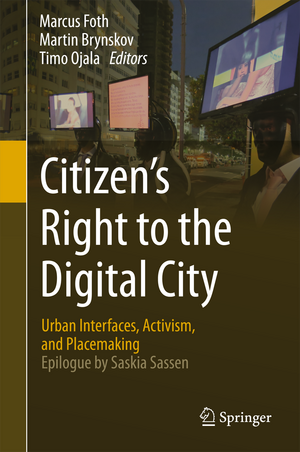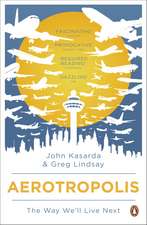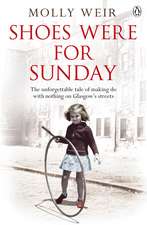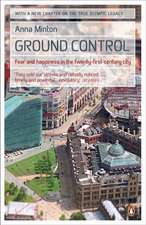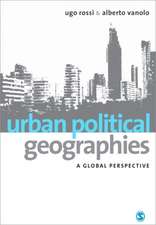Citizen’s Right to the Digital City: Urban Interfaces, Activism, and Placemaking
Editat de Marcus Foth, Martin Brynskov, Timo Ojalaen Limba Engleză Hardback – 8 ian 2016
| Toate formatele și edițiile | Preț | Express |
|---|---|---|
| Paperback (1) | 640.06 lei 6-8 săpt. | |
| Springer Nature Singapore – 11 dec 2018 | 640.06 lei 6-8 săpt. | |
| Hardback (1) | 646.30 lei 6-8 săpt. | |
| Springer Nature Singapore – 8 ian 2016 | 646.30 lei 6-8 săpt. |
Preț: 646.30 lei
Preț vechi: 760.35 lei
-15% Nou
Puncte Express: 969
Preț estimativ în valută:
123.68€ • 126.66$ • 102.89£
123.68€ • 126.66$ • 102.89£
Carte tipărită la comandă
Livrare economică 19 martie-02 aprilie
Preluare comenzi: 021 569.72.76
Specificații
ISBN-13: 9789812879172
ISBN-10: 981287917X
Pagini: 300
Ilustrații: XXVII, 259 p. 60 illus., 16 illus. in color.
Dimensiuni: 155 x 235 x 18 mm
Greutate: 0.58 kg
Ediția:1st ed. 2015
Editura: Springer Nature Singapore
Colecția Springer
Locul publicării:Singapore, Singapore
ISBN-10: 981287917X
Pagini: 300
Ilustrații: XXVII, 259 p. 60 illus., 16 illus. in color.
Dimensiuni: 155 x 235 x 18 mm
Greutate: 0.58 kg
Ediția:1st ed. 2015
Editura: Springer Nature Singapore
Colecția Springer
Locul publicării:Singapore, Singapore
Public țintă
ResearchCuprins
Socio-Cultural Role of Digital Screens in Urban Life.- Exploring Socio-Spatial Effects of Media Architectural Interfaces as Encounter Stages for Livable Cities.- An Eco-logic of Urban Interactive Environments.- Digital Participatory Budget: Local Democratic Practices in the Digital Era.
Recenzii
“The book is an interdisciplinary work, which brings urban planning and urbanisation, IT-development and informatics, financial issues and economics under the umbrella of spatial theory and geography. … The volume presents different viewpoints and aspects on urban informatics and digital urbanism, what makes it a useful handbook with its thirteen individual but connected chapters for geographers, sociologists, economists and urbanists, who are working in ICT-based urban development and design.” (Gyula Nagy, Hungarian Geographical Bulletin, Vol. 65 (3), 2016)
Notă biografică
Professor Marcus Foth is founder and director of the Urban Informatics Research Lab, and Professor of Interactive & Visual Design in the School of Design, Creative Industries Faculty at Queensland University of Technology. Marcus’ research focuses on the relationships between people, place and technology. He leads a cross-‐disciplinary team that develops practical approaches to complex urban problems. He adopts human-‐computer interaction and design methodologies to build engagement around emerging issues facing our cities. Marcus has authored and co-‐authored over 120 publications in journals, edited books, and conference proceedings.
Martin Brynskov, PhD, is associate professor in interaction technologies at the Department of Aesthetics and Communication at Aarhus University in Denmark. He is also research fellow at Participatory IT Centre (PIT) and Center for Advanced Visualization and Interaction (CAVI), director of the Digital Design Lab, co-founder of Smart Aarhus, and former director of the Civic Communication group at the Center for Digital Urban Living. He is the general chair of the Media Architecture Biennale 2012 and 2014. Working closely together with municipalities, artists, journalists, media organizations, and industrial partners, he investigates the consequences of digitization and explores new forms of mediation within a variety of domains with special focus on the role of social interaction, materials and interfaces. The research is mostly carried out as interventions and experiments in the wild, deploying prototypes and semi-‐permanent interactive systems.
Timo Ojala is professor of computer engineering at the Department of Electrical and Information Engineering of the University of Oulu and the director of the MediaTeam Oulu research group. He received his M.Sc. (with honors) and Dr.Tech. degrees in 1992 and 1997, respectively, from the University of Oulu, Finland. He is the responsible director of the UrBan Interactions(UBI) program, which aims at building a functional prototype of future ubiquitous city in Oulu. He has authored about 100 international scientific publications on mobile multimedia, human computer interaction, networking and computer vision. He has served as the founding co-chair of the 1st International Conference on Mobile and Ubiquitous Multimedia (MUM 2002), the general chair of MUM 2007 conference and in the program committees of many international conferences and workshops.
Marcus Foth, PhD, is Professor of Urban Informatics in the QUT Design Lab, Creative Industries Faculty at Queensland University of Technology. He is also an Honorary Professor in the School of Communication and Culture at Aarhus University, Denmark. Professor Foth’s research brings together people, place, and technology. His transdisciplinary work is at the international forefront of human-computer interaction research and development with a focus on smart cities, community engagement, media architecture, internet studies, ubiquitous computing, and sustainability. He has authored and co-authored over 180 publications in journals, edited books, and conference proceedings.
Martin Brynskov, PhD, is associate professor in interaction technologies at the Department of Aesthetics and Communication at Aarhus University in Denmark. He is also research fellow at Participatory IT Centre (PIT) and Center for Advanced Visualization and Interaction (CAVI), director of the Digital Design Lab, co-founder of Smart Aarhus, and former director of the Civic Communication group at the Center for Digital Urban Living. He is the general chair of the Media Architecture Biennale 2012 and 2014. Working closely together with municipalities, artists, journalists, media organizations, and industrial partners, he investigates the consequences of digitization and explores new forms of mediation within a variety of domains with special focus on the role of social interaction, materials and interfaces. The research is mostly carried out as interventions and experiments in the wild, deploying prototypes and semi-‐permanent interactive systems.
Timo Ojala is professor of computer engineering at the Department of Electrical and Information Engineering of the University of Oulu and the director of the MediaTeam Oulu research group. He received his M.Sc. (with honors) and Dr.Tech. degrees in 1992 and 1997, respectively, from the University of Oulu, Finland. He is the responsible director of the UrBan Interactions(UBI) program, which aims at building a functional prototype of future ubiquitous city in Oulu. He has authored about 100 international scientific publications on mobile multimedia, human computer interaction, networking and computer vision. He has served as the founding co-chair of the 1st International Conference on Mobile and Ubiquitous Multimedia (MUM 2002), the general chair of MUM 2007 conference and in the program committees of many international conferences and workshops.
Marcus Foth, PhD, is Professor of Urban Informatics in the QUT Design Lab, Creative Industries Faculty at Queensland University of Technology. He is also an Honorary Professor in the School of Communication and Culture at Aarhus University, Denmark. Professor Foth’s research brings together people, place, and technology. His transdisciplinary work is at the international forefront of human-computer interaction research and development with a focus on smart cities, community engagement, media architecture, internet studies, ubiquitous computing, and sustainability. He has authored and co-authored over 180 publications in journals, edited books, and conference proceedings.
Textul de pe ultima copertă
Edited by thought leaders in the fields of urban informatics and urban interaction design, this book brings together case studies and examples from around the world to discuss the role that urban interfaces, citizen action, and city making play in the quest to create and maintain not only secure and resilient, but productive, sustainable and viable urban environments. The book debates the impact of these trends on theory, policy and practice. The individual chapters are based on blind peer reviewed contributions by leading researchers working at the intersection of the social / cultural, technical / digital, and physical / spatial domains of urbanism scholarship. The book will appeal not only to researchers and students, but also to a vast number of practitioners in the private and public sector interested in accessible content that clearly and rigorously analyses the potential offered by urban interfaces, mobile technology, and location-based services in the context of engaging people with open, smart and participatory urban environments.
Caracteristici
Addresses the unique topic of relationship between urban interaction design, participatory and smart urbanism, and open innovation Presents contributions from multiple disciplines, with most chapters incorporating more than one disciplinary background Includes international collection of local case studies that illustrate the role that smart urbanism, civic hackers, and open innovation play to create productive, sustainable, and liveable urban environments Includes supplementary material: sn.pub/extras
